Reflective Practice: Evaluation of Gibb's Reflective Model in a Challenging Group Work Situation
VerifiedAdded on 2023/06/10
|10
|3751
|198
AI Summary
This article discusses the importance of reflective practice and evaluates Gibb's reflective model in a challenging group work situation where a learner had to work on their leadership skills. It includes a detailed analysis of the different stages of the model and how it helped the learner gain insights into their experiences. The article also includes an action plan for future improvements in communication, team working, and leadership skills.
Contribute Materials
Your contribution can guide someone’s learning journey. Share your
documents today.
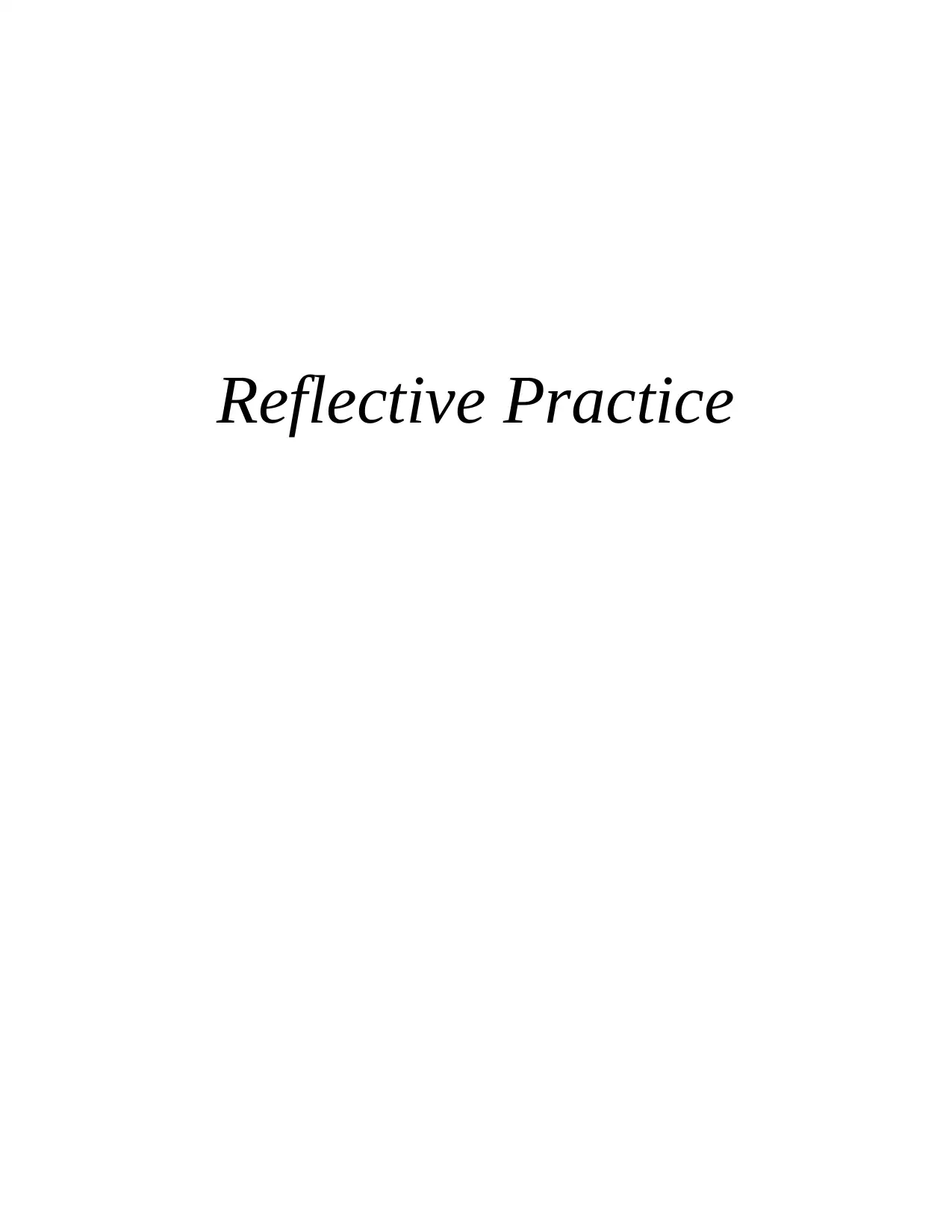
Reflective Practice
Secure Best Marks with AI Grader
Need help grading? Try our AI Grader for instant feedback on your assignments.
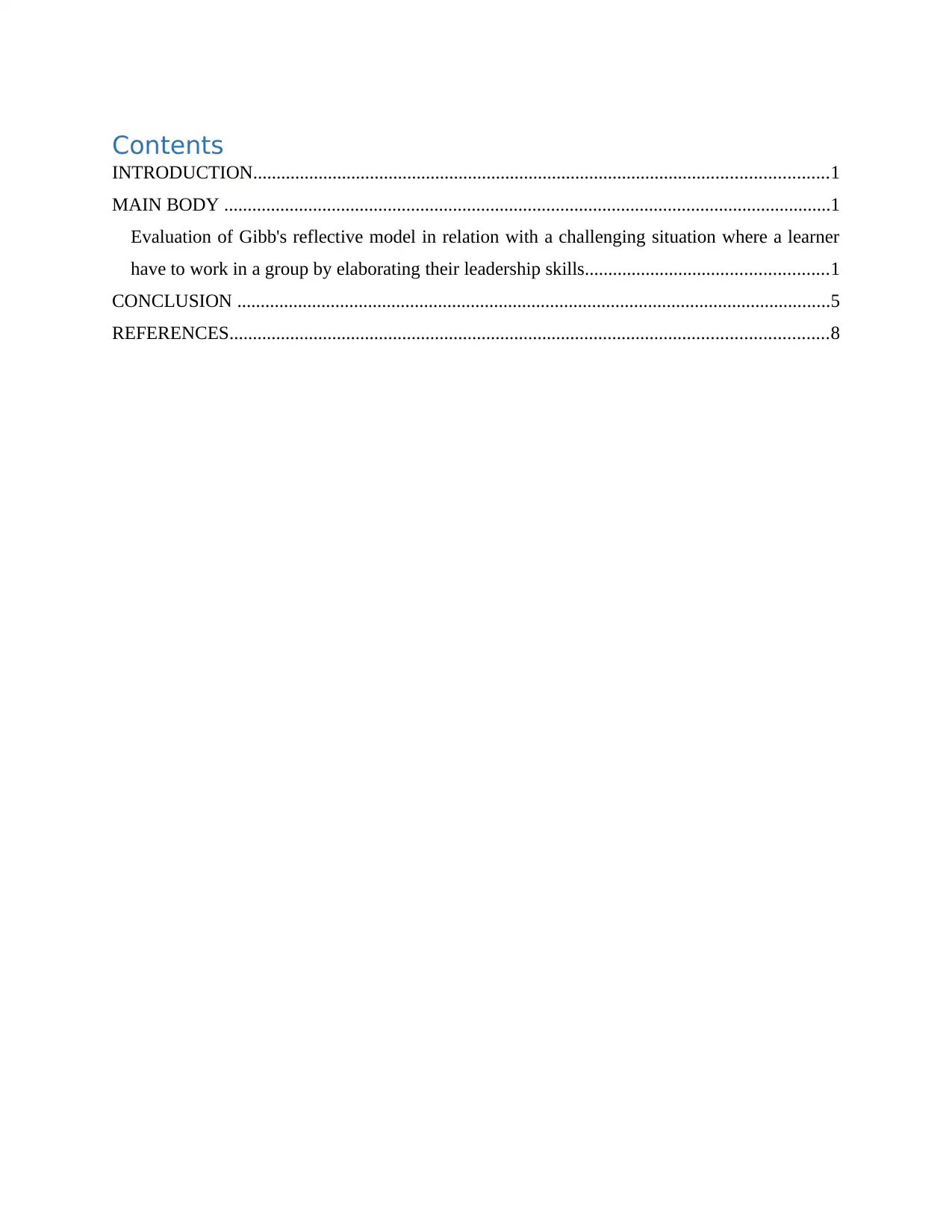
Contents
INTRODUCTION...........................................................................................................................1
MAIN BODY ..................................................................................................................................1
Evaluation of Gibb's reflective model in relation with a challenging situation where a learner
have to work in a group by elaborating their leadership skills....................................................1
CONCLUSION ...............................................................................................................................5
REFERENCES................................................................................................................................8
INTRODUCTION...........................................................................................................................1
MAIN BODY ..................................................................................................................................1
Evaluation of Gibb's reflective model in relation with a challenging situation where a learner
have to work in a group by elaborating their leadership skills....................................................1
CONCLUSION ...............................................................................................................................5
REFERENCES................................................................................................................................8
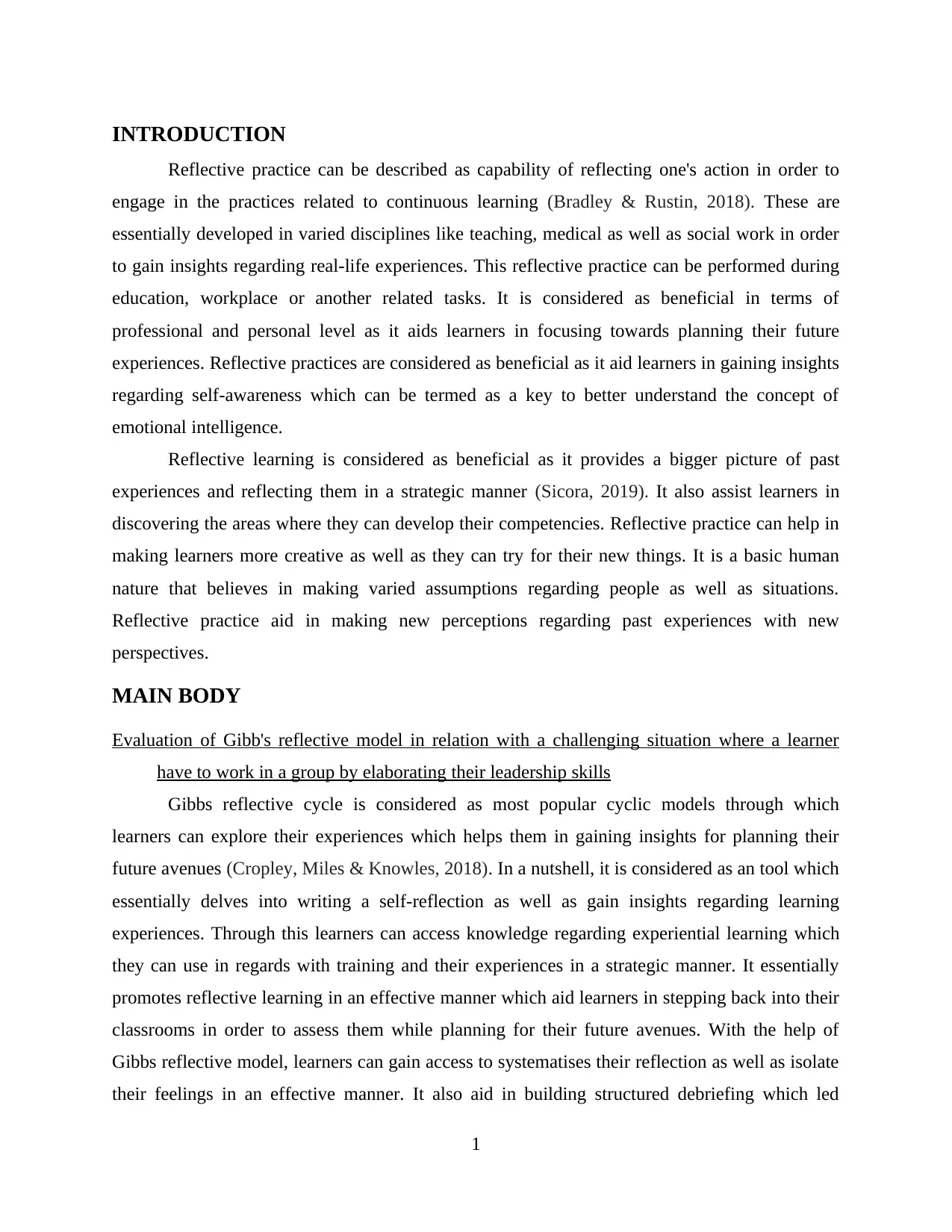
INTRODUCTION
Reflective practice can be described as capability of reflecting one's action in order to
engage in the practices related to continuous learning (Bradley & Rustin, 2018). These are
essentially developed in varied disciplines like teaching, medical as well as social work in order
to gain insights regarding real-life experiences. This reflective practice can be performed during
education, workplace or another related tasks. It is considered as beneficial in terms of
professional and personal level as it aids learners in focusing towards planning their future
experiences. Reflective practices are considered as beneficial as it aid learners in gaining insights
regarding self-awareness which can be termed as a key to better understand the concept of
emotional intelligence.
Reflective learning is considered as beneficial as it provides a bigger picture of past
experiences and reflecting them in a strategic manner (Sicora, 2019). It also assist learners in
discovering the areas where they can develop their competencies. Reflective practice can help in
making learners more creative as well as they can try for their new things. It is a basic human
nature that believes in making varied assumptions regarding people as well as situations.
Reflective practice aid in making new perceptions regarding past experiences with new
perspectives.
MAIN BODY
Evaluation of Gibb's reflective model in relation with a challenging situation where a learner
have to work in a group by elaborating their leadership skills
Gibbs reflective cycle is considered as most popular cyclic models through which
learners can explore their experiences which helps them in gaining insights for planning their
future avenues (Cropley, Miles & Knowles, 2018). In a nutshell, it is considered as an tool which
essentially delves into writing a self-reflection as well as gain insights regarding learning
experiences. Through this learners can access knowledge regarding experiential learning which
they can use in regards with training and their experiences in a strategic manner. It essentially
promotes reflective learning in an effective manner which aid learners in stepping back into their
classrooms in order to assess them while planning for their future avenues. With the help of
Gibbs reflective model, learners can gain access to systematises their reflection as well as isolate
their feelings in an effective manner. It also aid in building structured debriefing which led
1
Reflective practice can be described as capability of reflecting one's action in order to
engage in the practices related to continuous learning (Bradley & Rustin, 2018). These are
essentially developed in varied disciplines like teaching, medical as well as social work in order
to gain insights regarding real-life experiences. This reflective practice can be performed during
education, workplace or another related tasks. It is considered as beneficial in terms of
professional and personal level as it aids learners in focusing towards planning their future
experiences. Reflective practices are considered as beneficial as it aid learners in gaining insights
regarding self-awareness which can be termed as a key to better understand the concept of
emotional intelligence.
Reflective learning is considered as beneficial as it provides a bigger picture of past
experiences and reflecting them in a strategic manner (Sicora, 2019). It also assist learners in
discovering the areas where they can develop their competencies. Reflective practice can help in
making learners more creative as well as they can try for their new things. It is a basic human
nature that believes in making varied assumptions regarding people as well as situations.
Reflective practice aid in making new perceptions regarding past experiences with new
perspectives.
MAIN BODY
Evaluation of Gibb's reflective model in relation with a challenging situation where a learner
have to work in a group by elaborating their leadership skills
Gibbs reflective cycle is considered as most popular cyclic models through which
learners can explore their experiences which helps them in gaining insights for planning their
future avenues (Cropley, Miles & Knowles, 2018). In a nutshell, it is considered as an tool which
essentially delves into writing a self-reflection as well as gain insights regarding learning
experiences. Through this learners can access knowledge regarding experiential learning which
they can use in regards with training and their experiences in a strategic manner. It essentially
promotes reflective learning in an effective manner which aid learners in stepping back into their
classrooms in order to assess them while planning for their future avenues. With the help of
Gibbs reflective model, learners can gain access to systematises their reflection as well as isolate
their feelings in an effective manner. It also aid in building structured debriefing which led
1
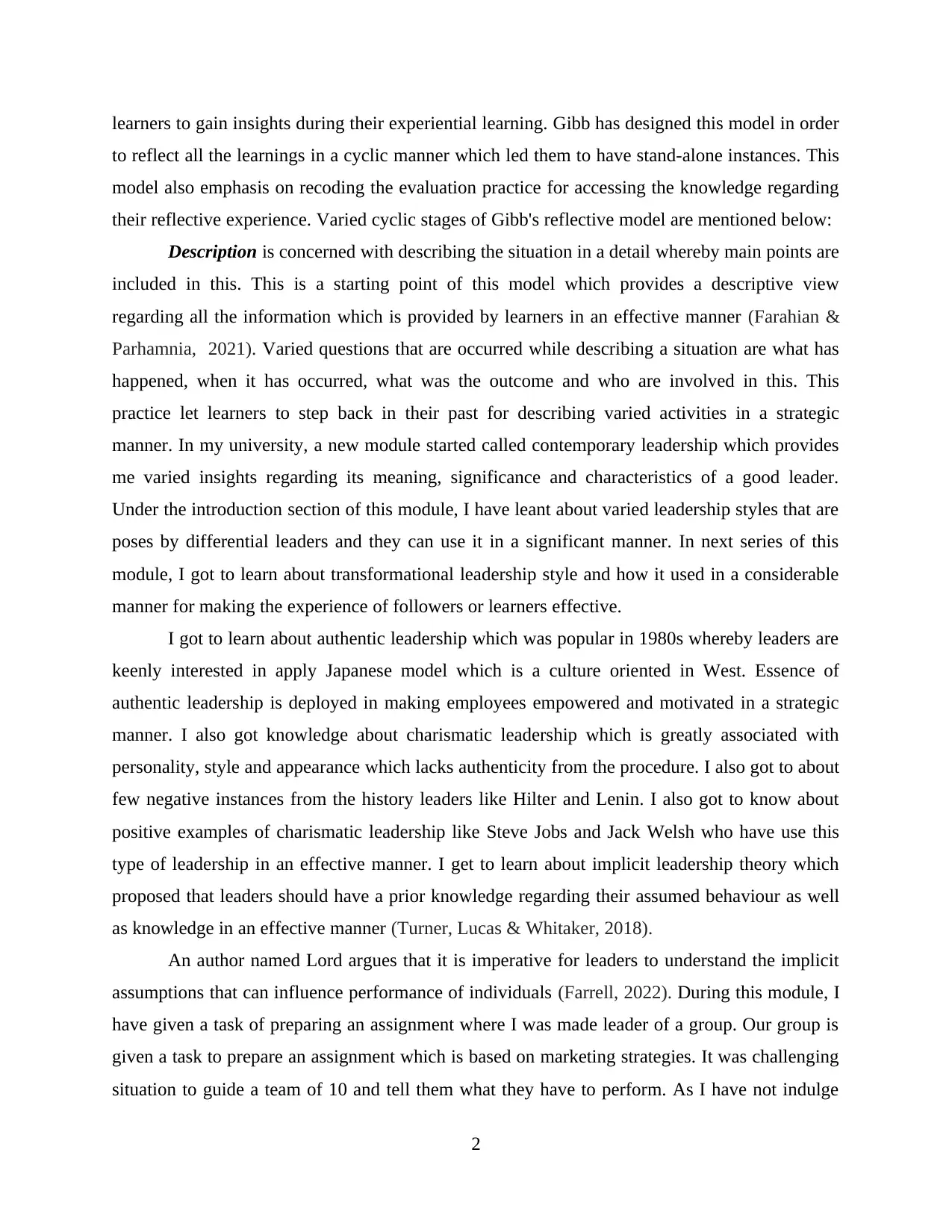
learners to gain insights during their experiential learning. Gibb has designed this model in order
to reflect all the learnings in a cyclic manner which led them to have stand-alone instances. This
model also emphasis on recoding the evaluation practice for accessing the knowledge regarding
their reflective experience. Varied cyclic stages of Gibb's reflective model are mentioned below:
Description is concerned with describing the situation in a detail whereby main points are
included in this. This is a starting point of this model which provides a descriptive view
regarding all the information which is provided by learners in an effective manner (Farahian &
Parhamnia, 2021). Varied questions that are occurred while describing a situation are what has
happened, when it has occurred, what was the outcome and who are involved in this. This
practice let learners to step back in their past for describing varied activities in a strategic
manner. In my university, a new module started called contemporary leadership which provides
me varied insights regarding its meaning, significance and characteristics of a good leader.
Under the introduction section of this module, I have leant about varied leadership styles that are
poses by differential leaders and they can use it in a significant manner. In next series of this
module, I got to learn about transformational leadership style and how it used in a considerable
manner for making the experience of followers or learners effective.
I got to learn about authentic leadership which was popular in 1980s whereby leaders are
keenly interested in apply Japanese model which is a culture oriented in West. Essence of
authentic leadership is deployed in making employees empowered and motivated in a strategic
manner. I also got knowledge about charismatic leadership which is greatly associated with
personality, style and appearance which lacks authenticity from the procedure. I also got to about
few negative instances from the history leaders like Hilter and Lenin. I also got to know about
positive examples of charismatic leadership like Steve Jobs and Jack Welsh who have use this
type of leadership in an effective manner. I get to learn about implicit leadership theory which
proposed that leaders should have a prior knowledge regarding their assumed behaviour as well
as knowledge in an effective manner (Turner, Lucas & Whitaker, 2018).
An author named Lord argues that it is imperative for leaders to understand the implicit
assumptions that can influence performance of individuals (Farrell, 2022). During this module, I
have given a task of preparing an assignment where I was made leader of a group. Our group is
given a task to prepare an assignment which is based on marketing strategies. It was challenging
situation to guide a team of 10 and tell them what they have to perform. As I have not indulge
2
to reflect all the learnings in a cyclic manner which led them to have stand-alone instances. This
model also emphasis on recoding the evaluation practice for accessing the knowledge regarding
their reflective experience. Varied cyclic stages of Gibb's reflective model are mentioned below:
Description is concerned with describing the situation in a detail whereby main points are
included in this. This is a starting point of this model which provides a descriptive view
regarding all the information which is provided by learners in an effective manner (Farahian &
Parhamnia, 2021). Varied questions that are occurred while describing a situation are what has
happened, when it has occurred, what was the outcome and who are involved in this. This
practice let learners to step back in their past for describing varied activities in a strategic
manner. In my university, a new module started called contemporary leadership which provides
me varied insights regarding its meaning, significance and characteristics of a good leader.
Under the introduction section of this module, I have leant about varied leadership styles that are
poses by differential leaders and they can use it in a significant manner. In next series of this
module, I got to learn about transformational leadership style and how it used in a considerable
manner for making the experience of followers or learners effective.
I got to learn about authentic leadership which was popular in 1980s whereby leaders are
keenly interested in apply Japanese model which is a culture oriented in West. Essence of
authentic leadership is deployed in making employees empowered and motivated in a strategic
manner. I also got knowledge about charismatic leadership which is greatly associated with
personality, style and appearance which lacks authenticity from the procedure. I also got to about
few negative instances from the history leaders like Hilter and Lenin. I also got to know about
positive examples of charismatic leadership like Steve Jobs and Jack Welsh who have use this
type of leadership in an effective manner. I get to learn about implicit leadership theory which
proposed that leaders should have a prior knowledge regarding their assumed behaviour as well
as knowledge in an effective manner (Turner, Lucas & Whitaker, 2018).
An author named Lord argues that it is imperative for leaders to understand the implicit
assumptions that can influence performance of individuals (Farrell, 2022). During this module, I
have given a task of preparing an assignment where I was made leader of a group. Our group is
given a task to prepare an assignment which is based on marketing strategies. It was challenging
situation to guide a team of 10 and tell them what they have to perform. As I have not indulge
2
Secure Best Marks with AI Grader
Need help grading? Try our AI Grader for instant feedback on your assignments.
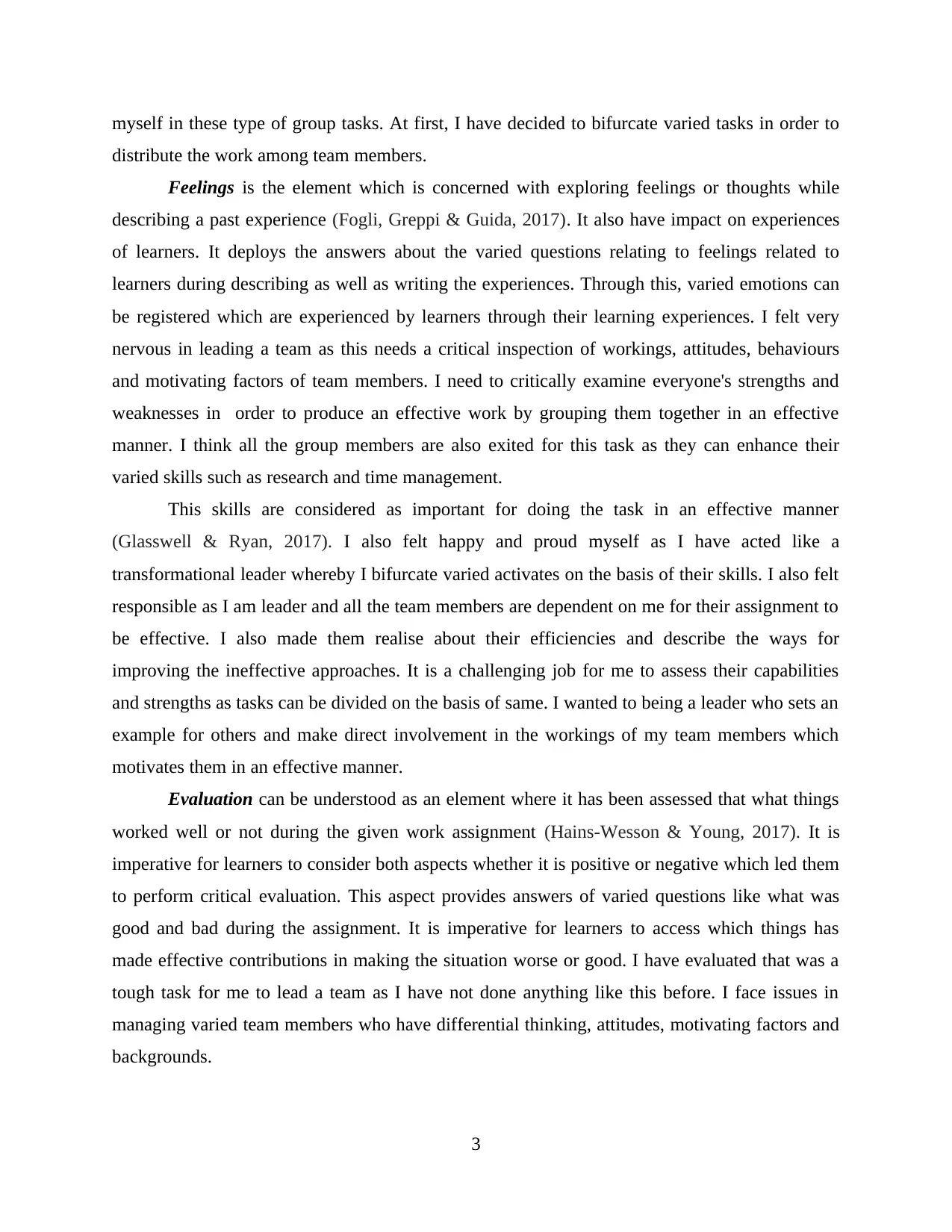
myself in these type of group tasks. At first, I have decided to bifurcate varied tasks in order to
distribute the work among team members.
Feelings is the element which is concerned with exploring feelings or thoughts while
describing a past experience (Fogli, Greppi & Guida, 2017). It also have impact on experiences
of learners. It deploys the answers about the varied questions relating to feelings related to
learners during describing as well as writing the experiences. Through this, varied emotions can
be registered which are experienced by learners through their learning experiences. I felt very
nervous in leading a team as this needs a critical inspection of workings, attitudes, behaviours
and motivating factors of team members. I need to critically examine everyone's strengths and
weaknesses in order to produce an effective work by grouping them together in an effective
manner. I think all the group members are also exited for this task as they can enhance their
varied skills such as research and time management.
This skills are considered as important for doing the task in an effective manner
(Glasswell & Ryan, 2017). I also felt happy and proud myself as I have acted like a
transformational leader whereby I bifurcate varied activates on the basis of their skills. I also felt
responsible as I am leader and all the team members are dependent on me for their assignment to
be effective. I also made them realise about their efficiencies and describe the ways for
improving the ineffective approaches. It is a challenging job for me to assess their capabilities
and strengths as tasks can be divided on the basis of same. I wanted to being a leader who sets an
example for others and make direct involvement in the workings of my team members which
motivates them in an effective manner.
Evaluation can be understood as an element where it has been assessed that what things
worked well or not during the given work assignment (Hains-Wesson & Young, 2017). It is
imperative for learners to consider both aspects whether it is positive or negative which led them
to perform critical evaluation. This aspect provides answers of varied questions like what was
good and bad during the assignment. It is imperative for learners to access which things has
made effective contributions in making the situation worse or good. I have evaluated that was a
tough task for me to lead a team as I have not done anything like this before. I face issues in
managing varied team members who have differential thinking, attitudes, motivating factors and
backgrounds.
3
distribute the work among team members.
Feelings is the element which is concerned with exploring feelings or thoughts while
describing a past experience (Fogli, Greppi & Guida, 2017). It also have impact on experiences
of learners. It deploys the answers about the varied questions relating to feelings related to
learners during describing as well as writing the experiences. Through this, varied emotions can
be registered which are experienced by learners through their learning experiences. I felt very
nervous in leading a team as this needs a critical inspection of workings, attitudes, behaviours
and motivating factors of team members. I need to critically examine everyone's strengths and
weaknesses in order to produce an effective work by grouping them together in an effective
manner. I think all the group members are also exited for this task as they can enhance their
varied skills such as research and time management.
This skills are considered as important for doing the task in an effective manner
(Glasswell & Ryan, 2017). I also felt happy and proud myself as I have acted like a
transformational leader whereby I bifurcate varied activates on the basis of their skills. I also felt
responsible as I am leader and all the team members are dependent on me for their assignment to
be effective. I also made them realise about their efficiencies and describe the ways for
improving the ineffective approaches. It is a challenging job for me to assess their capabilities
and strengths as tasks can be divided on the basis of same. I wanted to being a leader who sets an
example for others and make direct involvement in the workings of my team members which
motivates them in an effective manner.
Evaluation can be understood as an element where it has been assessed that what things
worked well or not during the given work assignment (Hains-Wesson & Young, 2017). It is
imperative for learners to consider both aspects whether it is positive or negative which led them
to perform critical evaluation. This aspect provides answers of varied questions like what was
good and bad during the assignment. It is imperative for learners to access which things has
made effective contributions in making the situation worse or good. I have evaluated that was a
tough task for me to lead a team as I have not done anything like this before. I face issues in
managing varied team members who have differential thinking, attitudes, motivating factors and
backgrounds.
3
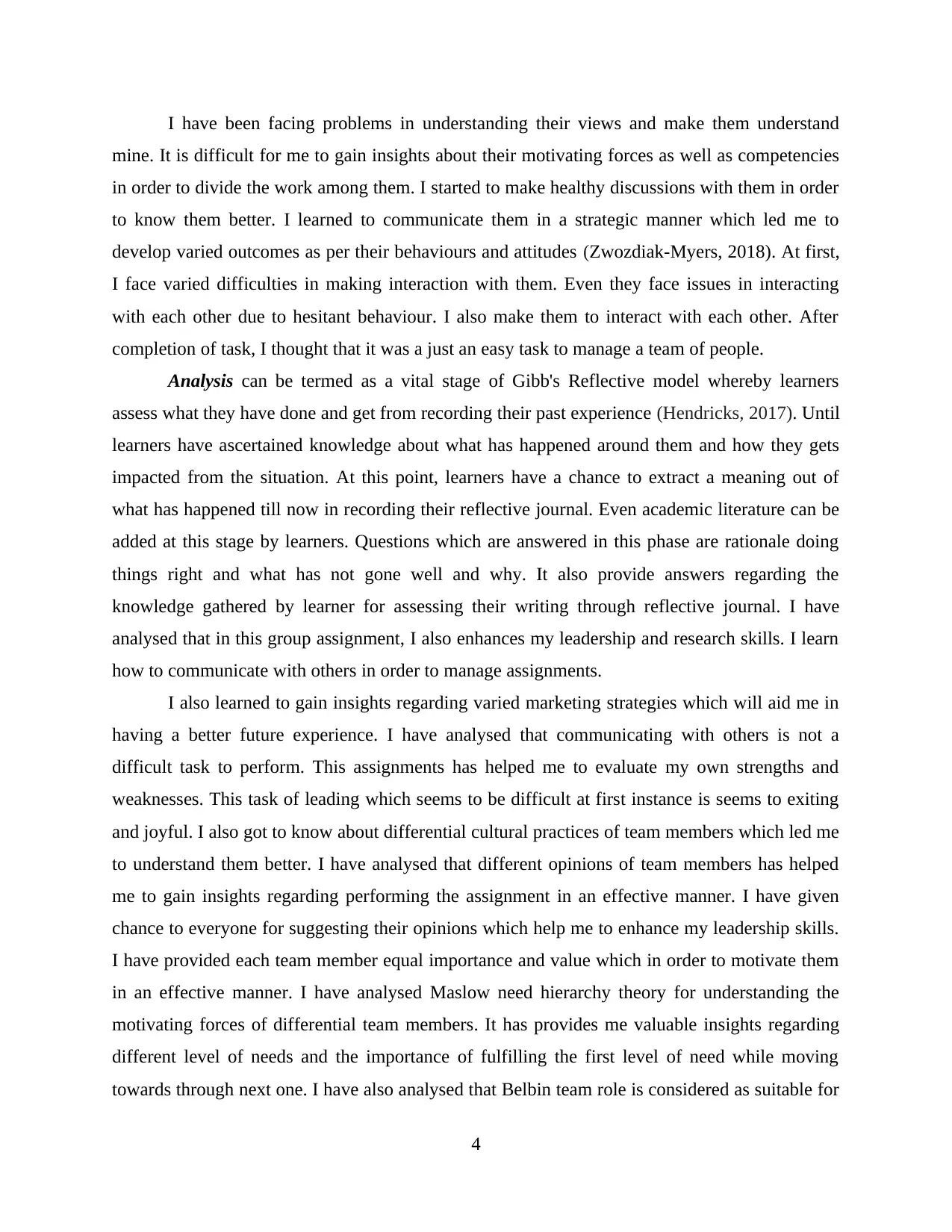
I have been facing problems in understanding their views and make them understand
mine. It is difficult for me to gain insights about their motivating forces as well as competencies
in order to divide the work among them. I started to make healthy discussions with them in order
to know them better. I learned to communicate them in a strategic manner which led me to
develop varied outcomes as per their behaviours and attitudes (Zwozdiak-Myers, 2018). At first,
I face varied difficulties in making interaction with them. Even they face issues in interacting
with each other due to hesitant behaviour. I also make them to interact with each other. After
completion of task, I thought that it was a just an easy task to manage a team of people.
Analysis can be termed as a vital stage of Gibb's Reflective model whereby learners
assess what they have done and get from recording their past experience (Hendricks, 2017). Until
learners have ascertained knowledge about what has happened around them and how they gets
impacted from the situation. At this point, learners have a chance to extract a meaning out of
what has happened till now in recording their reflective journal. Even academic literature can be
added at this stage by learners. Questions which are answered in this phase are rationale doing
things right and what has not gone well and why. It also provide answers regarding the
knowledge gathered by learner for assessing their writing through reflective journal. I have
analysed that in this group assignment, I also enhances my leadership and research skills. I learn
how to communicate with others in order to manage assignments.
I also learned to gain insights regarding varied marketing strategies which will aid me in
having a better future experience. I have analysed that communicating with others is not a
difficult task to perform. This assignments has helped me to evaluate my own strengths and
weaknesses. This task of leading which seems to be difficult at first instance is seems to exiting
and joyful. I also got to know about differential cultural practices of team members which led me
to understand them better. I have analysed that different opinions of team members has helped
me to gain insights regarding performing the assignment in an effective manner. I have given
chance to everyone for suggesting their opinions which help me to enhance my leadership skills.
I have provided each team member equal importance and value which in order to motivate them
in an effective manner. I have analysed Maslow need hierarchy theory for understanding the
motivating forces of differential team members. It has provides me valuable insights regarding
different level of needs and the importance of fulfilling the first level of need while moving
towards through next one. I have also analysed that Belbin team role is considered as suitable for
4
mine. It is difficult for me to gain insights about their motivating forces as well as competencies
in order to divide the work among them. I started to make healthy discussions with them in order
to know them better. I learned to communicate them in a strategic manner which led me to
develop varied outcomes as per their behaviours and attitudes (Zwozdiak-Myers, 2018). At first,
I face varied difficulties in making interaction with them. Even they face issues in interacting
with each other due to hesitant behaviour. I also make them to interact with each other. After
completion of task, I thought that it was a just an easy task to manage a team of people.
Analysis can be termed as a vital stage of Gibb's Reflective model whereby learners
assess what they have done and get from recording their past experience (Hendricks, 2017). Until
learners have ascertained knowledge about what has happened around them and how they gets
impacted from the situation. At this point, learners have a chance to extract a meaning out of
what has happened till now in recording their reflective journal. Even academic literature can be
added at this stage by learners. Questions which are answered in this phase are rationale doing
things right and what has not gone well and why. It also provide answers regarding the
knowledge gathered by learner for assessing their writing through reflective journal. I have
analysed that in this group assignment, I also enhances my leadership and research skills. I learn
how to communicate with others in order to manage assignments.
I also learned to gain insights regarding varied marketing strategies which will aid me in
having a better future experience. I have analysed that communicating with others is not a
difficult task to perform. This assignments has helped me to evaluate my own strengths and
weaknesses. This task of leading which seems to be difficult at first instance is seems to exiting
and joyful. I also got to know about differential cultural practices of team members which led me
to understand them better. I have analysed that different opinions of team members has helped
me to gain insights regarding performing the assignment in an effective manner. I have given
chance to everyone for suggesting their opinions which help me to enhance my leadership skills.
I have provided each team member equal importance and value which in order to motivate them
in an effective manner. I have analysed Maslow need hierarchy theory for understanding the
motivating forces of differential team members. It has provides me valuable insights regarding
different level of needs and the importance of fulfilling the first level of need while moving
towards through next one. I have also analysed that Belbin team role is considered as suitable for
4
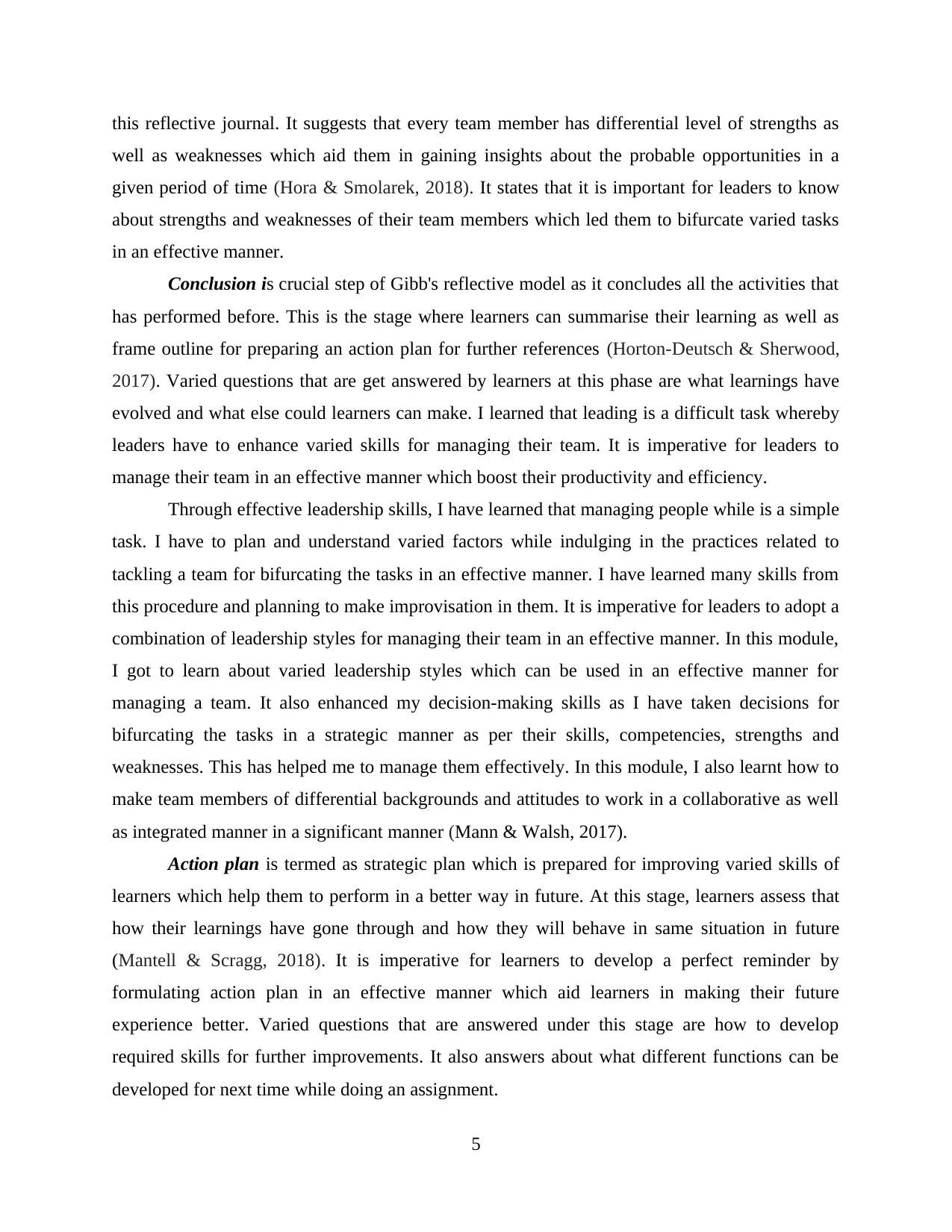
this reflective journal. It suggests that every team member has differential level of strengths as
well as weaknesses which aid them in gaining insights about the probable opportunities in a
given period of time (Hora & Smolarek, 2018). It states that it is important for leaders to know
about strengths and weaknesses of their team members which led them to bifurcate varied tasks
in an effective manner.
Conclusion is crucial step of Gibb's reflective model as it concludes all the activities that
has performed before. This is the stage where learners can summarise their learning as well as
frame outline for preparing an action plan for further references (Horton-Deutsch & Sherwood,
2017). Varied questions that are get answered by learners at this phase are what learnings have
evolved and what else could learners can make. I learned that leading is a difficult task whereby
leaders have to enhance varied skills for managing their team. It is imperative for leaders to
manage their team in an effective manner which boost their productivity and efficiency.
Through effective leadership skills, I have learned that managing people while is a simple
task. I have to plan and understand varied factors while indulging in the practices related to
tackling a team for bifurcating the tasks in an effective manner. I have learned many skills from
this procedure and planning to make improvisation in them. It is imperative for leaders to adopt a
combination of leadership styles for managing their team in an effective manner. In this module,
I got to learn about varied leadership styles which can be used in an effective manner for
managing a team. It also enhanced my decision-making skills as I have taken decisions for
bifurcating the tasks in a strategic manner as per their skills, competencies, strengths and
weaknesses. This has helped me to manage them effectively. In this module, I also learnt how to
make team members of differential backgrounds and attitudes to work in a collaborative as well
as integrated manner in a significant manner (Mann & Walsh, 2017).
Action plan is termed as strategic plan which is prepared for improving varied skills of
learners which help them to perform in a better way in future. At this stage, learners assess that
how their learnings have gone through and how they will behave in same situation in future
(Mantell & Scragg, 2018). It is imperative for learners to develop a perfect reminder by
formulating action plan in an effective manner which aid learners in making their future
experience better. Varied questions that are answered under this stage are how to develop
required skills for further improvements. It also answers about what different functions can be
developed for next time while doing an assignment.
5
well as weaknesses which aid them in gaining insights about the probable opportunities in a
given period of time (Hora & Smolarek, 2018). It states that it is important for leaders to know
about strengths and weaknesses of their team members which led them to bifurcate varied tasks
in an effective manner.
Conclusion is crucial step of Gibb's reflective model as it concludes all the activities that
has performed before. This is the stage where learners can summarise their learning as well as
frame outline for preparing an action plan for further references (Horton-Deutsch & Sherwood,
2017). Varied questions that are get answered by learners at this phase are what learnings have
evolved and what else could learners can make. I learned that leading is a difficult task whereby
leaders have to enhance varied skills for managing their team. It is imperative for leaders to
manage their team in an effective manner which boost their productivity and efficiency.
Through effective leadership skills, I have learned that managing people while is a simple
task. I have to plan and understand varied factors while indulging in the practices related to
tackling a team for bifurcating the tasks in an effective manner. I have learned many skills from
this procedure and planning to make improvisation in them. It is imperative for leaders to adopt a
combination of leadership styles for managing their team in an effective manner. In this module,
I got to learn about varied leadership styles which can be used in an effective manner for
managing a team. It also enhanced my decision-making skills as I have taken decisions for
bifurcating the tasks in a strategic manner as per their skills, competencies, strengths and
weaknesses. This has helped me to manage them effectively. In this module, I also learnt how to
make team members of differential backgrounds and attitudes to work in a collaborative as well
as integrated manner in a significant manner (Mann & Walsh, 2017).
Action plan is termed as strategic plan which is prepared for improving varied skills of
learners which help them to perform in a better way in future. At this stage, learners assess that
how their learnings have gone through and how they will behave in same situation in future
(Mantell & Scragg, 2018). It is imperative for learners to develop a perfect reminder by
formulating action plan in an effective manner which aid learners in making their future
experience better. Varied questions that are answered under this stage are how to develop
required skills for further improvements. It also answers about what different functions can be
developed for next time while doing an assignment.
5
Paraphrase This Document
Need a fresh take? Get an instant paraphrase of this document with our AI Paraphraser
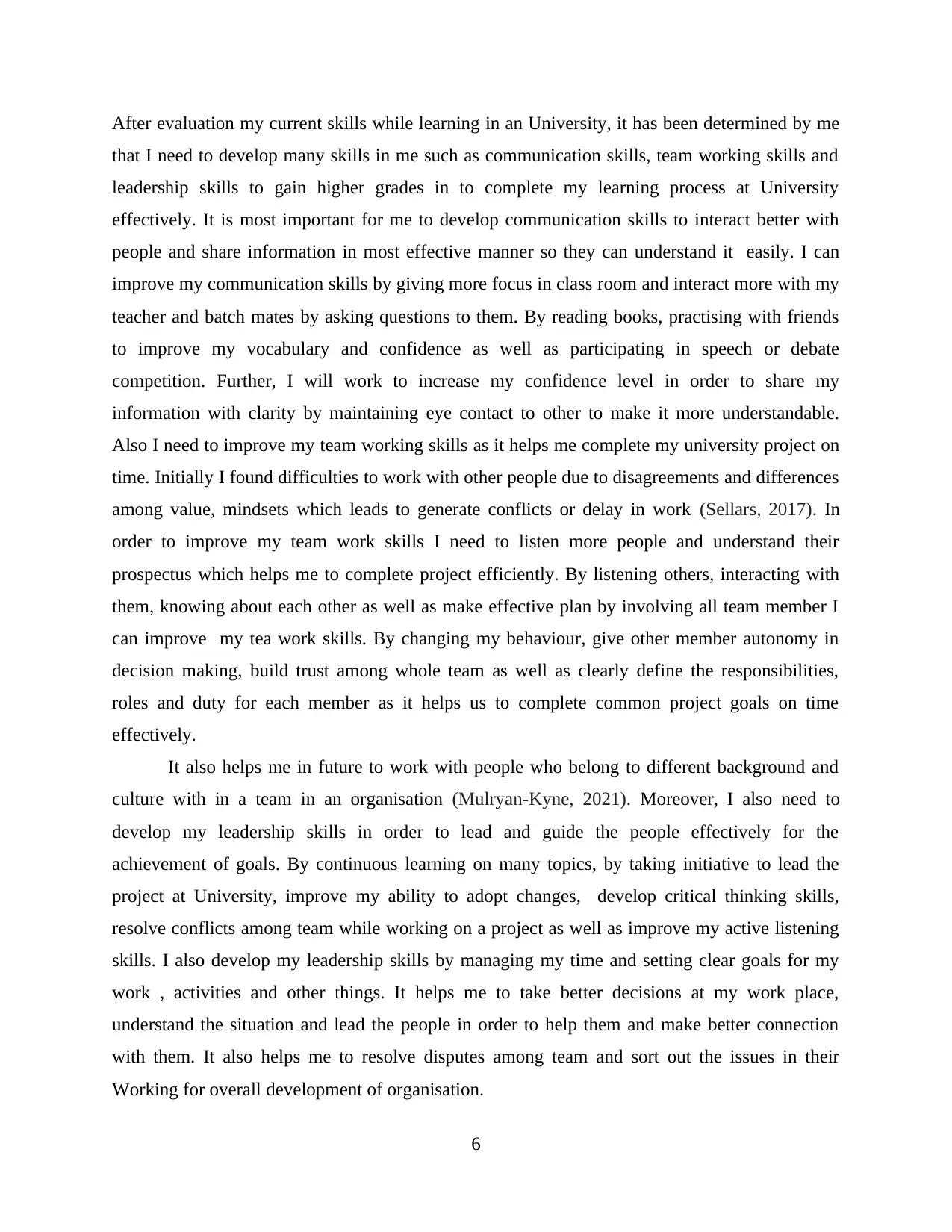
After evaluation my current skills while learning in an University, it has been determined by me
that I need to develop many skills in me such as communication skills, team working skills and
leadership skills to gain higher grades in to complete my learning process at University
effectively. It is most important for me to develop communication skills to interact better with
people and share information in most effective manner so they can understand it easily. I can
improve my communication skills by giving more focus in class room and interact more with my
teacher and batch mates by asking questions to them. By reading books, practising with friends
to improve my vocabulary and confidence as well as participating in speech or debate
competition. Further, I will work to increase my confidence level in order to share my
information with clarity by maintaining eye contact to other to make it more understandable.
Also I need to improve my team working skills as it helps me complete my university project on
time. Initially I found difficulties to work with other people due to disagreements and differences
among value, mindsets which leads to generate conflicts or delay in work (Sellars, 2017). In
order to improve my team work skills I need to listen more people and understand their
prospectus which helps me to complete project efficiently. By listening others, interacting with
them, knowing about each other as well as make effective plan by involving all team member I
can improve my tea work skills. By changing my behaviour, give other member autonomy in
decision making, build trust among whole team as well as clearly define the responsibilities,
roles and duty for each member as it helps us to complete common project goals on time
effectively.
It also helps me in future to work with people who belong to different background and
culture with in a team in an organisation (Mulryan-Kyne, 2021). Moreover, I also need to
develop my leadership skills in order to lead and guide the people effectively for the
achievement of goals. By continuous learning on many topics, by taking initiative to lead the
project at University, improve my ability to adopt changes, develop critical thinking skills,
resolve conflicts among team while working on a project as well as improve my active listening
skills. I also develop my leadership skills by managing my time and setting clear goals for my
work , activities and other things. It helps me to take better decisions at my work place,
understand the situation and lead the people in order to help them and make better connection
with them. It also helps me to resolve disputes among team and sort out the issues in their
Working for overall development of organisation.
6
that I need to develop many skills in me such as communication skills, team working skills and
leadership skills to gain higher grades in to complete my learning process at University
effectively. It is most important for me to develop communication skills to interact better with
people and share information in most effective manner so they can understand it easily. I can
improve my communication skills by giving more focus in class room and interact more with my
teacher and batch mates by asking questions to them. By reading books, practising with friends
to improve my vocabulary and confidence as well as participating in speech or debate
competition. Further, I will work to increase my confidence level in order to share my
information with clarity by maintaining eye contact to other to make it more understandable.
Also I need to improve my team working skills as it helps me complete my university project on
time. Initially I found difficulties to work with other people due to disagreements and differences
among value, mindsets which leads to generate conflicts or delay in work (Sellars, 2017). In
order to improve my team work skills I need to listen more people and understand their
prospectus which helps me to complete project efficiently. By listening others, interacting with
them, knowing about each other as well as make effective plan by involving all team member I
can improve my tea work skills. By changing my behaviour, give other member autonomy in
decision making, build trust among whole team as well as clearly define the responsibilities,
roles and duty for each member as it helps us to complete common project goals on time
effectively.
It also helps me in future to work with people who belong to different background and
culture with in a team in an organisation (Mulryan-Kyne, 2021). Moreover, I also need to
develop my leadership skills in order to lead and guide the people effectively for the
achievement of goals. By continuous learning on many topics, by taking initiative to lead the
project at University, improve my ability to adopt changes, develop critical thinking skills,
resolve conflicts among team while working on a project as well as improve my active listening
skills. I also develop my leadership skills by managing my time and setting clear goals for my
work , activities and other things. It helps me to take better decisions at my work place,
understand the situation and lead the people in order to help them and make better connection
with them. It also helps me to resolve disputes among team and sort out the issues in their
Working for overall development of organisation.
6
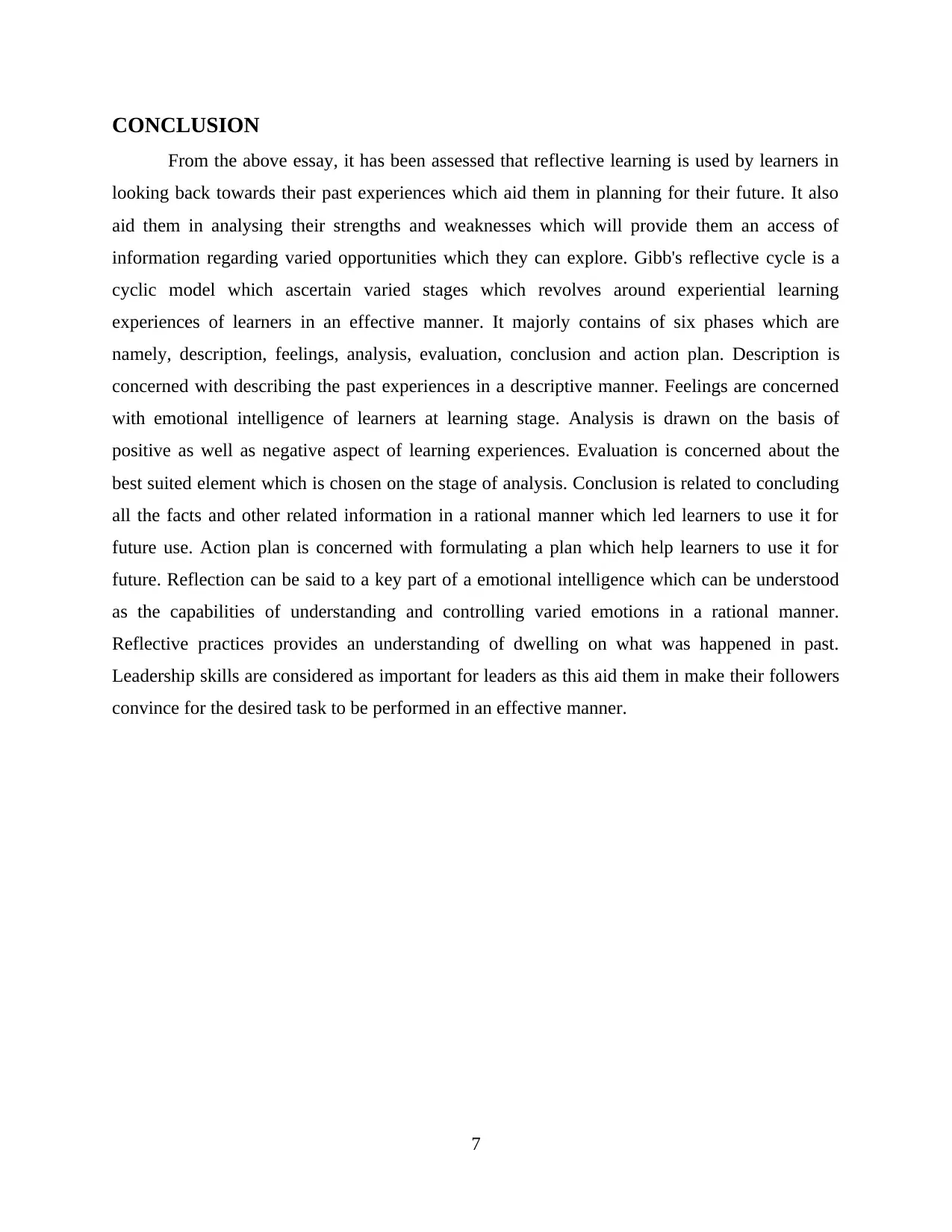
CONCLUSION
From the above essay, it has been assessed that reflective learning is used by learners in
looking back towards their past experiences which aid them in planning for their future. It also
aid them in analysing their strengths and weaknesses which will provide them an access of
information regarding varied opportunities which they can explore. Gibb's reflective cycle is a
cyclic model which ascertain varied stages which revolves around experiential learning
experiences of learners in an effective manner. It majorly contains of six phases which are
namely, description, feelings, analysis, evaluation, conclusion and action plan. Description is
concerned with describing the past experiences in a descriptive manner. Feelings are concerned
with emotional intelligence of learners at learning stage. Analysis is drawn on the basis of
positive as well as negative aspect of learning experiences. Evaluation is concerned about the
best suited element which is chosen on the stage of analysis. Conclusion is related to concluding
all the facts and other related information in a rational manner which led learners to use it for
future use. Action plan is concerned with formulating a plan which help learners to use it for
future. Reflection can be said to a key part of a emotional intelligence which can be understood
as the capabilities of understanding and controlling varied emotions in a rational manner.
Reflective practices provides an understanding of dwelling on what was happened in past.
Leadership skills are considered as important for leaders as this aid them in make their followers
convince for the desired task to be performed in an effective manner.
7
From the above essay, it has been assessed that reflective learning is used by learners in
looking back towards their past experiences which aid them in planning for their future. It also
aid them in analysing their strengths and weaknesses which will provide them an access of
information regarding varied opportunities which they can explore. Gibb's reflective cycle is a
cyclic model which ascertain varied stages which revolves around experiential learning
experiences of learners in an effective manner. It majorly contains of six phases which are
namely, description, feelings, analysis, evaluation, conclusion and action plan. Description is
concerned with describing the past experiences in a descriptive manner. Feelings are concerned
with emotional intelligence of learners at learning stage. Analysis is drawn on the basis of
positive as well as negative aspect of learning experiences. Evaluation is concerned about the
best suited element which is chosen on the stage of analysis. Conclusion is related to concluding
all the facts and other related information in a rational manner which led learners to use it for
future use. Action plan is concerned with formulating a plan which help learners to use it for
future. Reflection can be said to a key part of a emotional intelligence which can be understood
as the capabilities of understanding and controlling varied emotions in a rational manner.
Reflective practices provides an understanding of dwelling on what was happened in past.
Leadership skills are considered as important for leaders as this aid them in make their followers
convince for the desired task to be performed in an effective manner.
7
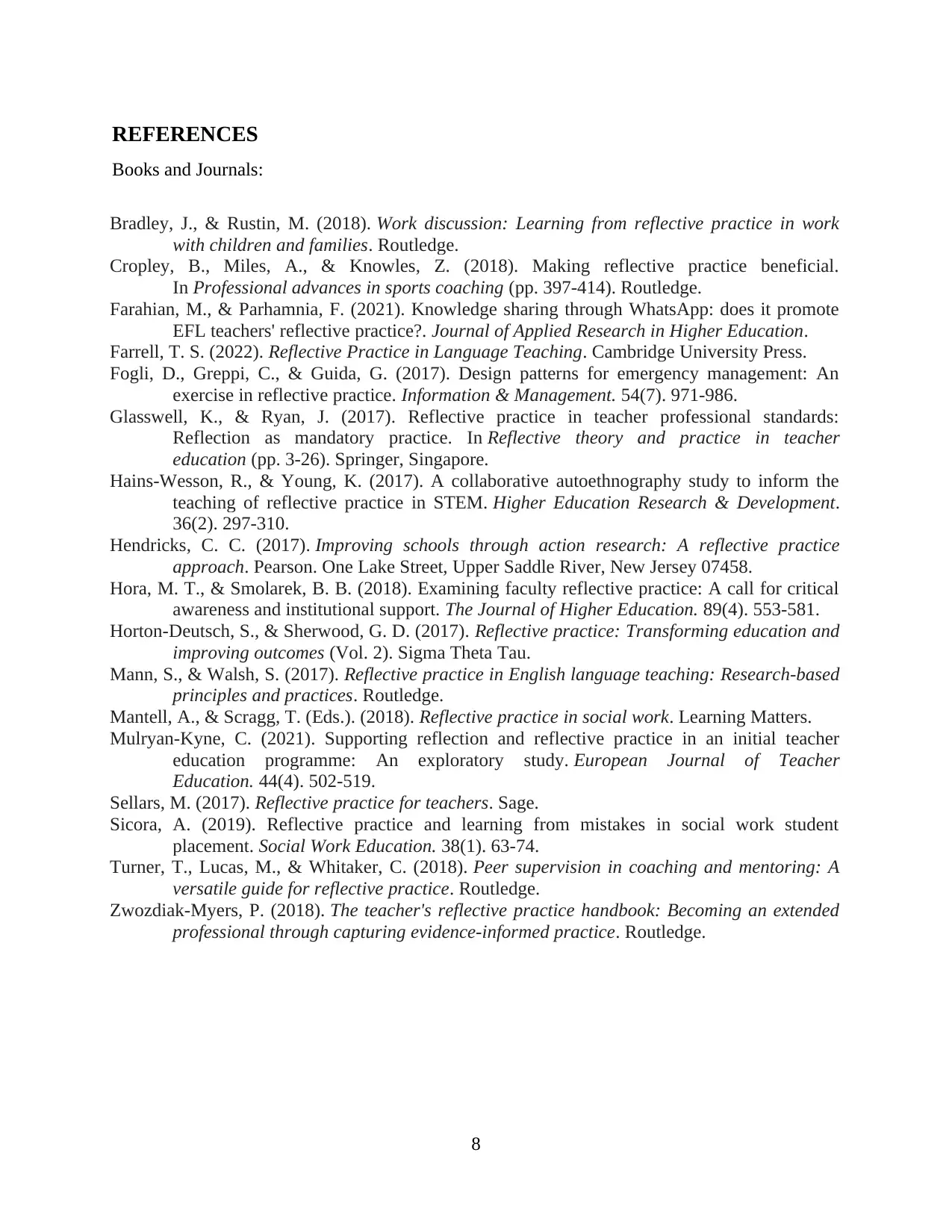
REFERENCES
Books and Journals:
Bradley, J., & Rustin, M. (2018). Work discussion: Learning from reflective practice in work
with children and families. Routledge.
Cropley, B., Miles, A., & Knowles, Z. (2018). Making reflective practice beneficial.
In Professional advances in sports coaching (pp. 397-414). Routledge.
Farahian, M., & Parhamnia, F. (2021). Knowledge sharing through WhatsApp: does it promote
EFL teachers' reflective practice?. Journal of Applied Research in Higher Education.
Farrell, T. S. (2022). Reflective Practice in Language Teaching. Cambridge University Press.
Fogli, D., Greppi, C., & Guida, G. (2017). Design patterns for emergency management: An
exercise in reflective practice. Information & Management. 54(7). 971-986.
Glasswell, K., & Ryan, J. (2017). Reflective practice in teacher professional standards:
Reflection as mandatory practice. In Reflective theory and practice in teacher
education (pp. 3-26). Springer, Singapore.
Hains-Wesson, R., & Young, K. (2017). A collaborative autoethnography study to inform the
teaching of reflective practice in STEM. Higher Education Research & Development.
36(2). 297-310.
Hendricks, C. C. (2017). Improving schools through action research: A reflective practice
approach. Pearson. One Lake Street, Upper Saddle River, New Jersey 07458.
Hora, M. T., & Smolarek, B. B. (2018). Examining faculty reflective practice: A call for critical
awareness and institutional support. The Journal of Higher Education. 89(4). 553-581.
Horton-Deutsch, S., & Sherwood, G. D. (2017). Reflective practice: Transforming education and
improving outcomes (Vol. 2). Sigma Theta Tau.
Mann, S., & Walsh, S. (2017). Reflective practice in English language teaching: Research-based
principles and practices. Routledge.
Mantell, A., & Scragg, T. (Eds.). (2018). Reflective practice in social work. Learning Matters.
Mulryan-Kyne, C. (2021). Supporting reflection and reflective practice in an initial teacher
education programme: An exploratory study. European Journal of Teacher
Education. 44(4). 502-519.
Sellars, M. (2017). Reflective practice for teachers. Sage.
Sicora, A. (2019). Reflective practice and learning from mistakes in social work student
placement. Social Work Education. 38(1). 63-74.
Turner, T., Lucas, M., & Whitaker, C. (2018). Peer supervision in coaching and mentoring: A
versatile guide for reflective practice. Routledge.
Zwozdiak-Myers, P. (2018). The teacher's reflective practice handbook: Becoming an extended
professional through capturing evidence-informed practice. Routledge.
8
Books and Journals:
Bradley, J., & Rustin, M. (2018). Work discussion: Learning from reflective practice in work
with children and families. Routledge.
Cropley, B., Miles, A., & Knowles, Z. (2018). Making reflective practice beneficial.
In Professional advances in sports coaching (pp. 397-414). Routledge.
Farahian, M., & Parhamnia, F. (2021). Knowledge sharing through WhatsApp: does it promote
EFL teachers' reflective practice?. Journal of Applied Research in Higher Education.
Farrell, T. S. (2022). Reflective Practice in Language Teaching. Cambridge University Press.
Fogli, D., Greppi, C., & Guida, G. (2017). Design patterns for emergency management: An
exercise in reflective practice. Information & Management. 54(7). 971-986.
Glasswell, K., & Ryan, J. (2017). Reflective practice in teacher professional standards:
Reflection as mandatory practice. In Reflective theory and practice in teacher
education (pp. 3-26). Springer, Singapore.
Hains-Wesson, R., & Young, K. (2017). A collaborative autoethnography study to inform the
teaching of reflective practice in STEM. Higher Education Research & Development.
36(2). 297-310.
Hendricks, C. C. (2017). Improving schools through action research: A reflective practice
approach. Pearson. One Lake Street, Upper Saddle River, New Jersey 07458.
Hora, M. T., & Smolarek, B. B. (2018). Examining faculty reflective practice: A call for critical
awareness and institutional support. The Journal of Higher Education. 89(4). 553-581.
Horton-Deutsch, S., & Sherwood, G. D. (2017). Reflective practice: Transforming education and
improving outcomes (Vol. 2). Sigma Theta Tau.
Mann, S., & Walsh, S. (2017). Reflective practice in English language teaching: Research-based
principles and practices. Routledge.
Mantell, A., & Scragg, T. (Eds.). (2018). Reflective practice in social work. Learning Matters.
Mulryan-Kyne, C. (2021). Supporting reflection and reflective practice in an initial teacher
education programme: An exploratory study. European Journal of Teacher
Education. 44(4). 502-519.
Sellars, M. (2017). Reflective practice for teachers. Sage.
Sicora, A. (2019). Reflective practice and learning from mistakes in social work student
placement. Social Work Education. 38(1). 63-74.
Turner, T., Lucas, M., & Whitaker, C. (2018). Peer supervision in coaching and mentoring: A
versatile guide for reflective practice. Routledge.
Zwozdiak-Myers, P. (2018). The teacher's reflective practice handbook: Becoming an extended
professional through capturing evidence-informed practice. Routledge.
8
1 out of 10
Related Documents
Your All-in-One AI-Powered Toolkit for Academic Success.
+13062052269
info@desklib.com
Available 24*7 on WhatsApp / Email
![[object Object]](/_next/static/media/star-bottom.7253800d.svg)
Unlock your academic potential
© 2024 | Zucol Services PVT LTD | All rights reserved.


